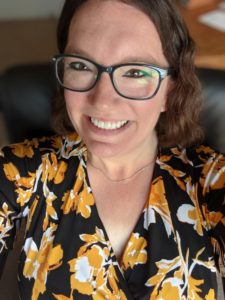Poet-a-Day: Meet Katie Manning
Many years ago, the late Brett Foster, a wonderful friend and poet, introduced me to Katie Manning at the AWP conference in Seattle. Little did I know that this brilliant and effusive poet would soon become a dear friend and literary angel. When I’m on a poetic search, I can always count on the prolific Manning to come through. With two pieces in How to Write a Form Poem, a ghazal and a found poem, she does not disappoint.
Here are the first first lines of her found poem, “The Book of Class.” It’s a short erasure poem, so this is all you get for now. Read the rest in How to Write a Form Poem! And, of course, get your hands on Manning’s books.
The Book of Class (excerpt)
all that remains of Ecclesiastes
the days
will say
find
pleasure in
the light
the clouds
the windows
—Katie Manning
Tania Runyan (TR): Tell me a little about the origin story of “The Book of Class.”
Katie Manning (KM): This poem is part of a larger project that I began for two reasons:
1. I was tired of people taking language from the Bible out of context and using it as a weapon against other people, so I wanted to work on a project that responded to that problem.
2. I had just finished my dissertation, given birth to my first child, and landed a full-time professor position, and I knew that I needed to give myself a strict assignment if I was going to keep myself writing with so many other things vying for my time and attention.
This project was my assignment: I would take some of the language from the last chapter of each book of the Bible and create a poem from it. I began the project in anger, but as I worked on it, I was surprised by how closely this process resembled the practice of Lectio Divina, and I found humor and beauty along the way. I was also struck by the fact that I’m always working with a limited bank of words (my own vocabulary) even when I craft poems that are not erasures.
TR: “The Book of Class” came out of Ecclesiastes. How does an erasure poem call up your imagination and emotional response to a text? How do you know what to erase?
KM: I don’t approach an erasure poem as “erasing” anything, strangely enough. I think of it more in terms of a word bank: here is the language I have available, and now I’ll choose which words stand out to me and combine them to create something new. To me, it’s like a Rorschach test; the original text is the inkblot, and I’m trying to identify a new shape within it. Then my poem becomes another sort of Rorschach test as well.
I’ve had readers think that the poems in this project are funny or devotional or edgy or directly commenting on the book in which I found the language or directly commenting on something in our own historical moment… and all of those readings are possible. I love the way poetry allows for and revels in ambiguity, and found texts especially draw attention to the layers of meaning in their language.
TR: What do you hope poets can learn from a book like How to Write a Form Poem?
KM: Often people who are newer to writing in forms (or who had a bad experience with being forced to write in a traditional form in school) think of poetic forms as a hindrance, an obstacle to creativity and expression. I hope a book like this will show more poets that forms can be generative tools, almost co-creators, and can push poets to insights and images that they might never have reached otherwise.
About Katie Manning
Katie Manning is the founding editor-in-chief of Whale Road Review and a professor of writing at Point Loma Nazarene University in San Diego. She is the author of Tasty Other, which won the 2016 Main Street Rag Poetry Book Award, and her fifth chapbook, 28,065 Nights, is from River Glass Books. Her poems have appeared in American Journal of Nursing, december, The Lascaux Review, New Letters, Poet Lore, Stirring, THRUSH, Verse Daily, and many other venues.
Hear a poem of Katie’s on NPR’s “On Being”
Hear Katie Read “The Book of Class”
go to 48:56 to hear Katie read
Photo by Giuseppe Milo, Creative Commons, via Flickr. Post by Tania Runyan.
Browse more Poet-a-Day
Browse 50 States of Generosity
Check out The Yellow Wall-paper Graphic Novel
BUY ‘HOW TO WRITE A FORM POEM’ NOW!
- Flowers of California: California Poppy - December 8, 2022
- Flowers of California: Lily of the Nile - October 13, 2022
- Flowers of California: Crape Myrtle - October 5, 2022



L.L. Barkat says
This poem really showed what the power of this form can be. I loved it and was very happy it was in the book.
It’s a process of both distillation and imagination that preserves the original at some level but then brings the poet’s voice through what she has decided to see. Really nice, Katie!
Tania Runyan says
I agree, Laura. I think some people think found poetry doesn’t demand much from us, but I find the opposite to be true. Yes, using another source can give needed structure and an impetus to get started, but it is truly a collaborative effort between two writers working together in spirit!
Bethany Rohde says
I appreciate what Katie Manning says here (amongst other places), “I don’t approach an erasure poem as “erasing” anything, strangely enough. I think of it more in terms of a word bank: here is the language I have available, and now I’ll choose which words stand out to me and combine them to create something new. ”
And I *just* finished reading the found poetry chapter of the book last night and the rest of that beautiful poem. Clicked off the book light, and ruminated on mining for words and what possibilities it might lead to. What might I make?
Katie Manning says
I love this, Bethany. I hope you make some surprising and wonderful poems!
Tania Runyan says
Bethany, the possibilities other writers give us with their words are endless. Writing found poetry is such a mysterious and rewarding process.
Bethany R. says
Just want to give a shout-out of thanks! I was inspired by the book, and encouraged by this interview as well. Went ahead and wrote a freeform found poem called, “Dip Into the spoon of an oak.” Such a pleasurable experience to puzzle it together. Thanks again for the guidance! 🙂
(Should you want to take a peek, I got it down to just three lines. It published yesterday in the Emily D. Tea Traveler magazine. https://bit.ly/3iQuepe )
Laurie Klein says
Bethany, how quietly vivid, mysterious, and invitational. Lovely!
Bethany says
Oh Laurie, thank you! (And I was just reading your “Cure for Regret” post this morning and got called away partway through. Hoping to finish it this evening.) Thanks again for reading my poem and letting me know how it struck you!
Laurie Klein says
Gosh, what an inspired project! I admire how Katie’s spirited initiative and curiosity gradually mined anger’s potential seams of ore, then gently angled toward curation (a little breathing space for holding words up to the light? burnishing select facets?), and finally culminated within the loving gaze and listening posture I associate with lectio.
Tania Runyan says
Beautifully said, Laurie. Almost. . .a poem in itself? Maybe I’ll mine your response!
Sandra Heska King says
“I don’t approach an erasure poem as “erasing” anything, strangely enough. I think of it more in terms of a word bank: here is the language I have available, and now I’ll choose which words stand out to me and combine them to create something new.”
I love that. I also enjoy writing found poetry. I was glad to stumble upon Annie Dillard’s collection Mornings Like This: Found Poems a few years back.
I recently started to write down phrases I like or make my heart skip a beat as I do my daily Bible reading(currently Ezekiel), being unsure what I’d do with them, but just starting a collection.
I’ll be looking for more of your writings. 🙂
Tania Runyan says
Sandra, I love to collect words, too! You never know what poems will grow out of those little heart-skipping moments.